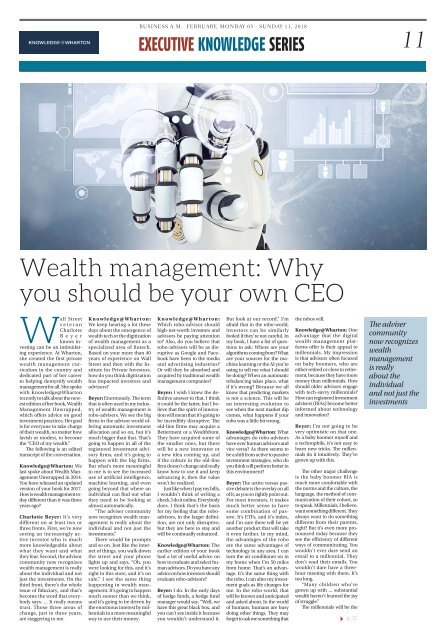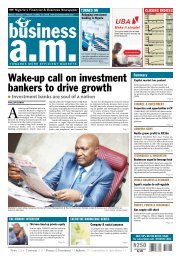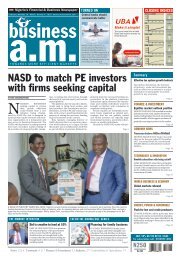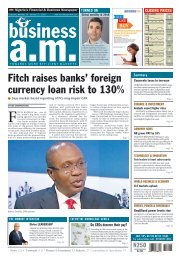You also want an ePaper? Increase the reach of your titles
YUMPU automatically turns print PDFs into web optimized ePapers that Google loves.
BUSINESS A.M. FEBRUARY, MONDAY <strong>05</strong> - SUNDAY 11, 20<strong>18</strong><br />
EXECUTIVE KNOWLEDGE SERIES<br />
11<br />
Wealth management: Why<br />
you should be your own CEO<br />
Wall Street<br />
veteran<br />
Charlotte<br />
B e y e r<br />
knows investing<br />
can be an intimidating<br />
experience. At Wharton,<br />
she created the first private<br />
wealth management curriculum<br />
in the country and<br />
dedicated part of her career<br />
to helping demystify wealth<br />
management for all. She spoke<br />
with Knowledge@Wharton<br />
recently to talk about the newest<br />
edition of her book, Wealth<br />
Management Unwrapped,<br />
which offers advice on good<br />
investment practices. Her goal<br />
is for everyone to take charge<br />
of their wealth, no matter how<br />
lavish or modest, to become<br />
the “CEO of my wealth.”<br />
The following is an edited<br />
transcript of the conversation.<br />
Knowledge@Wharton: We<br />
last spoke about Wealth Management<br />
Unwrapped in 2014.<br />
You have released an updated<br />
version of your book for 2017.<br />
How is wealth management today<br />
different than it was three<br />
years ago?<br />
Charlotte Beyer: It’s very<br />
different on at least two or<br />
three fronts. First, we’re now<br />
seeing an increasingly active<br />
investor who is much<br />
more knowledgeable about<br />
what they want and what<br />
they fear. Second, the advisor<br />
community now recognizes<br />
wealth management is really<br />
about the individual and not<br />
just the investments. On the<br />
third front, there’s the whole<br />
issue of fiduciary, and that’s<br />
become the word that everybody<br />
says. … It really means<br />
trust. Those three areas of<br />
change, just in three years,<br />
are staggering to me.<br />
Knowledge@Wharton:<br />
We keep hearing a lot these<br />
days about the emergence of<br />
wealth tech or the digitization<br />
of wealth management as a<br />
specialized area of fintech.<br />
Based on your more than 40<br />
years of experience on Wall<br />
Street and then with the Institute<br />
for Private Investors,<br />
how do you think digitization<br />
has impacted investors and<br />
advisors?<br />
Beyer: Enormously. The term<br />
that is often used in my industry<br />
of wealth management is<br />
robo-advisers. We see the big<br />
firms in the advisor world offering<br />
automatic investment<br />
allocation and so on, but it’s<br />
much bigger than that. That’s<br />
going to happen in all of the<br />
registered investment advisory<br />
firms, and it’s going to<br />
happen with the big firms.<br />
But what’s more meaningful<br />
to me is to see the increased<br />
use of artificial intelligence,<br />
machine learning, and even<br />
going beyond that where an<br />
individual can find out what<br />
they need to be looking at<br />
almost automatically.<br />
“The adviser community<br />
now recognizes wealth management<br />
is really about the<br />
individual and not just the<br />
investments.”<br />
There would be prompts<br />
and so on. Just like the internet<br />
of things, you walk down<br />
the street and your phone<br />
lights up and says, “Oh, you<br />
were looking for this, and it’s<br />
right in this store, and it’s on<br />
sale.” I see the same thing<br />
happening in wealth management.<br />
It’s going to happen<br />
much sooner than we think,<br />
and it’s going to be driven by<br />
the enormous interest by millennials<br />
in a more meaningful<br />
way to use their money.<br />
Knowledge@Wharton:<br />
Which robo-advisor should<br />
high-net-worth investors and<br />
advisors be paying attention<br />
to? Also, do you believe that<br />
robo-advisors will be as disruptive<br />
as Google and Facebook<br />
have been to the media<br />
and advertising industries?<br />
Or will they be absorbed and<br />
acquired by traditional wealth<br />
management companies?<br />
Beyer: I wish I knew the definitive<br />
answer to that. I think<br />
it could be the latter, but I believe<br />
that the spirit of innovation<br />
will mean that it’s going to<br />
be incredibly disruptive. The<br />
old-line firms may acquire a<br />
Betterment or a Wealthfront.<br />
They have acquired some of<br />
the smaller ones, but there<br />
will be a new innovator or<br />
a new idea coming up, and<br />
if the culture in the old-line<br />
firm doesn’t change and really<br />
know how to use it and keep<br />
advancing it, then the value<br />
won’t be realized.<br />
Just like when I pay my bills,<br />
I wouldn’t think of writing a<br />
check. I do it online. Everybody<br />
does. I think that’s the basis<br />
for my feeling that the roboadvisors,<br />
in the larger definition,<br />
are not only disruptive,<br />
but they are here to stay and<br />
will be continually enhanced.<br />
Knowledge@Wharton: The<br />
earlier edition of your book<br />
had a lot of useful advice on<br />
how to evaluate and select human<br />
advisors. Do you have any<br />
advice on how investors should<br />
evaluate robo-advisors?<br />
Beyer: I do. In the early days<br />
of hedge funds, a hedge fund<br />
manager would say, “Well, we<br />
have this great black box, and<br />
you can’t see inside it because<br />
you wouldn’t understand it.<br />
But look at our record.” I’m<br />
afraid that in the robo-world,<br />
investors can be similarly<br />
fooled if they’re not careful. In<br />
my book, I have a list of questions<br />
to ask: Where are your<br />
algorithms coming from? What<br />
are your sources for the machine<br />
learning or the AI you’re<br />
using to tell me what I should<br />
be doing? When an automatic<br />
rebalancing takes place, what<br />
if it’s wrong? Because we all<br />
know that predicting markets<br />
is not a science. This will be<br />
an interesting evolution to<br />
see when the next market dip<br />
comes, what happens if your<br />
robo was a little bit wrong.<br />
Knowledge@Wharton: What<br />
advantages do robo-advisors<br />
have over human advisors and<br />
vice versa? As there seems to<br />
be a shift from active to passive<br />
investment strategies, who do<br />
you think will perform better in<br />
this environment?<br />
Beyer: The active versus passive<br />
debate is the overlay on all<br />
of it, as you so rightly point out.<br />
For most investors, it makes<br />
much better sense to have<br />
some combination of passive.<br />
It’s ETFs, and it’s index,<br />
and I’m sure there will be yet<br />
another product that will take<br />
it even further. In my mind,<br />
the advantages of the robo<br />
are the same advantages of<br />
technology in any area. I can<br />
turn the air conditioner on in<br />
my home when I’m 50 miles<br />
from home. That’s an advantage.<br />
It’s the same thing with<br />
the robo. I can alter my investment<br />
goals as life changes for<br />
me. In the robo-world, that<br />
will be known and anticipated<br />
and asked about. In the world<br />
of humans, humans are busy<br />
doing other things. They may<br />
forget to ask me something that<br />
the robos will.<br />
Knowledge@Wharton: One<br />
advantage that the digital<br />
wealth management platforms<br />
offer is their appeal to<br />
millennials. My impression<br />
is that advisors often focused<br />
on baby boomers, who are<br />
either retired or close to retirement,<br />
because they have more<br />
money than millennials. How<br />
should older advisors engage<br />
with tech-savvy millennials?<br />
How can registered investment<br />
advisers (RIAs) become better<br />
informed about technology<br />
and innovation?<br />
Beyer: I’m not going to be<br />
very optimistic on that one.<br />
As a baby boomer myself and<br />
a technophile, it’s not easy to<br />
learn new tricks. The millennials<br />
do it intuitively. They’ve<br />
grown up with this.<br />
The other major challenge<br />
is the baby boomer RIA is<br />
much more comfortable with<br />
the norms and the culture, the<br />
language, the method of communication<br />
of their cohort, so<br />
to speak. Millennials, I believe,<br />
want something different. They<br />
always want to do something<br />
different from their parents,<br />
right? But it’s even more pronounced<br />
today because they<br />
see the efficiency of different<br />
ways of communicating. You<br />
wouldn’t ever dare send an<br />
email to a millennial. They<br />
don’t read their emails. You<br />
wouldn’t dare have a threehour<br />
meeting with them. It’s<br />
too long.<br />
“Many children who’ve<br />
grown up with … substantial<br />
wealth haven’t learned the joy<br />
of struggle.”<br />
The millennials will be the<br />
p. 12<br />
The adviser<br />
community<br />
now recognizes<br />
wealth<br />
management<br />
is really<br />
about the<br />
individual<br />
and not just the<br />
investments










